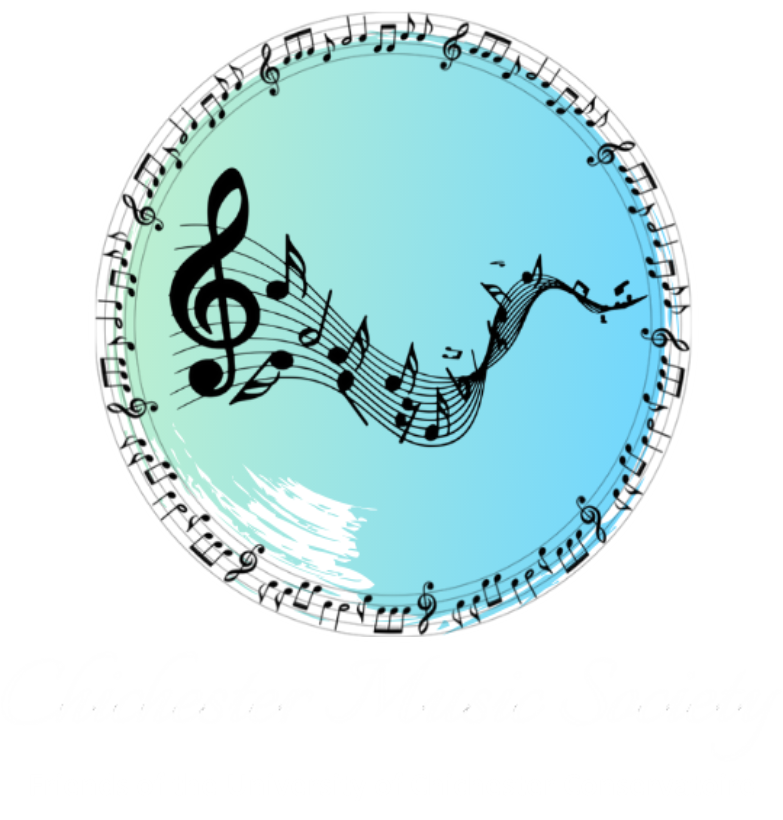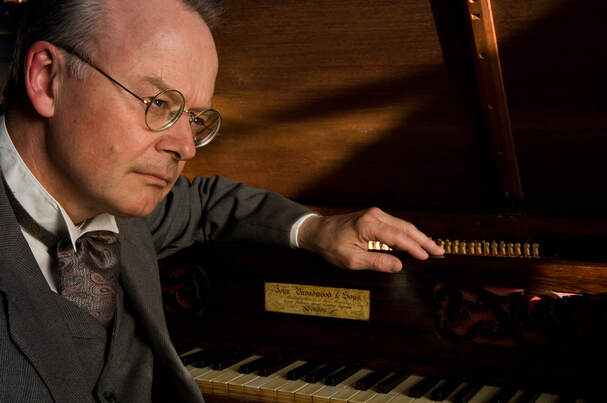
December
David Owen Norris
Chichester Music Society was pleased to welcome David Owen Norris on 9 December at the University of Chichester when he gave his lecture recital entitled “Beethoven at the Piano - a Path of his own Discovery.” This concert was live-streamed courtesy of the University.
David Owen Norris is a consummate and experienced lecturer and pianist, performing all over the world and presenting regularly on BBC radio & TV including BBC Proms Extra.
He started his lecture/recital on a historical note, pointing out that Beethoven had had lessons on the harpsichord, but that he was a self-taught musician on the piano. He was of course an exceptional pianist as well as a composer, able almost effortlessly to improvise, as he showed aged 21, when he just added variations to his performance of his own work, the Righini Variations, by playing new variations in the elegant style he had just heard for the first time.
Throughout his presentation, David Owen Norris played a wide range of illustrative excerpts from Beethoven’s compositions to emphasise the points he was making. He explained that Beethoven, over the coming years, began to create his own style of playing in his compositions, such as adding scales and trills from 1791. The result was that we began to hear phrases such as “mercurial characteristics” or “irreverent impudence” that surround reviews of his music.
David Owen Norris then played the Moonlight Sonata, Opus 27, No 2, which was written in 1802 when Beethoven knew he was going deaf, the final movement a poignant reminder that the composer did not accept this threat to his life of music. The transformation from the tranquil first movement to the finale was ably played by the pianist, where he created endlessly varied colourings and subtle changes in dynamics and phrasing, with a firm and exciting finale. A real loss to members that no audience was able to be present to enjoy this fine performance.
The second piece was the Sonata Pathetique Opus 13, which was written in 1799. Again, this was beautifully performed, with the pianist ably interpreting the fiery and darker elements of the music.
The final piece was a special composition for the evening. David Owen Norris created a possible scenario imagining that were Beethoven alive today, being Christmas, he might have added a set of variations on a Christmas carol to his catalogue of works. Thus, our lecturer and pianist gave us a set of Christmas variations written in the style of Beethoven. This was an exercise which really worked and seemed to this reviewer to be eminently possible and would believably be approved of by Beethoven himself!
Chris Hough, Chairman of Chichester Music Society, thanked David Owen Norris, and said, “This was a wonderful evening, and it was fitting to have such a remarkable and sensitive pianist and presenter to end our 2020 celebration of Beethoven’s birth 250 years ago. What a delight to be able to enjoy David’s remarkable compositional skills and share his fascinating interpretations and insights into Beethoven’s great music.”
David Owen Norris
Chichester Music Society was pleased to welcome David Owen Norris on 9 December at the University of Chichester when he gave his lecture recital entitled “Beethoven at the Piano - a Path of his own Discovery.” This concert was live-streamed courtesy of the University.
David Owen Norris is a consummate and experienced lecturer and pianist, performing all over the world and presenting regularly on BBC radio & TV including BBC Proms Extra.
He started his lecture/recital on a historical note, pointing out that Beethoven had had lessons on the harpsichord, but that he was a self-taught musician on the piano. He was of course an exceptional pianist as well as a composer, able almost effortlessly to improvise, as he showed aged 21, when he just added variations to his performance of his own work, the Righini Variations, by playing new variations in the elegant style he had just heard for the first time.
Throughout his presentation, David Owen Norris played a wide range of illustrative excerpts from Beethoven’s compositions to emphasise the points he was making. He explained that Beethoven, over the coming years, began to create his own style of playing in his compositions, such as adding scales and trills from 1791. The result was that we began to hear phrases such as “mercurial characteristics” or “irreverent impudence” that surround reviews of his music.
David Owen Norris then played the Moonlight Sonata, Opus 27, No 2, which was written in 1802 when Beethoven knew he was going deaf, the final movement a poignant reminder that the composer did not accept this threat to his life of music. The transformation from the tranquil first movement to the finale was ably played by the pianist, where he created endlessly varied colourings and subtle changes in dynamics and phrasing, with a firm and exciting finale. A real loss to members that no audience was able to be present to enjoy this fine performance.
The second piece was the Sonata Pathetique Opus 13, which was written in 1799. Again, this was beautifully performed, with the pianist ably interpreting the fiery and darker elements of the music.
The final piece was a special composition for the evening. David Owen Norris created a possible scenario imagining that were Beethoven alive today, being Christmas, he might have added a set of variations on a Christmas carol to his catalogue of works. Thus, our lecturer and pianist gave us a set of Christmas variations written in the style of Beethoven. This was an exercise which really worked and seemed to this reviewer to be eminently possible and would believably be approved of by Beethoven himself!
Chris Hough, Chairman of Chichester Music Society, thanked David Owen Norris, and said, “This was a wonderful evening, and it was fitting to have such a remarkable and sensitive pianist and presenter to end our 2020 celebration of Beethoven’s birth 250 years ago. What a delight to be able to enjoy David’s remarkable compositional skills and share his fascinating interpretations and insights into Beethoven’s great music.”
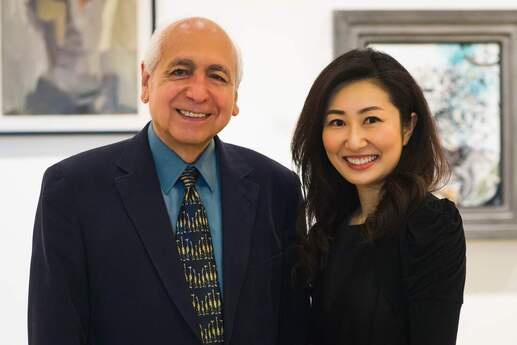
November
Martino Tirimo & Atsuko Kawakami
Chichester Music Society [CMS] was able to continue holding concerts in this second lockdown thanks to Chichester University’s willingness to live stream the concert from the University’s Chapel on 11 November. Martino Tirimo was originally going to be part of the Rosamunde Trio for this concert, but unfortunately two of the Trio were unable to travel from the USA, due to the Covid crisis and were unable to attend. However, Martino offered to come with fellow pianist, Atsuko Kawakami, one of his former students, and this offer was gratefully accepted.
The concert had been originally planned by Chris Coote, Treasurer of CMS, who tragically died in September, and Martino opened the concert by saying that he wanted to dedicate this concert to Chris Coote’s memory, as he was one of his close musical friends. The programme was entitled “The Dance in Music.”
The concert opened with a performance of The St. Anthony Variations, a piece written by Brahms in 1873, and although attributed to Haydn, this is probably not the case. The two pianists, each on their own piano, played seamlessly together as a duo, each taking turns, and each ending with an identical flourish. They produced a performance of variety, with passion and excitement, blending with some really sensitive interpretations of the more melancholy sections.
We were then introduced to three pieces from the Argentinian composer, Carlos Gustavino, whose music was mightily influenced by South American folk music. One of the pieces Los Ninos, [the children] was very appropriately titled, with playful and witty sections, mixed with expressive and sometimes vivacious, sometimes soulful, childlike behaviours. The music from all three pieces flowed and bounced along with an enthusiasm that was admirably captured by the pianists.
After a short interval, the concluding piece was Tchaikovsky’s Nutcracker Suite. So well known, the duo exhibited great musicianship and versatility in their interpretation, from delicate phrasing and expressive lines, to many moments of brilliance and excitement. This was a concert played with the highest level of artistry.
As Chris Hough, Chairman of Chichester Music Society, said at the end of this performance of the Nutcracker, “if this concert had been held with a live audience there would have been huge appreciative applause. I am extremely grateful to Martino and Atsuko for giving us this wonderful concert and for their incredibly uplifting performances, two distinguished musicians, a perfect duo.” He asked the performers for an encore and received a glowing piece of Ravel, the Habanera from his Rapsodie Espagnole.
Martino Tirimo & Atsuko Kawakami
Chichester Music Society [CMS] was able to continue holding concerts in this second lockdown thanks to Chichester University’s willingness to live stream the concert from the University’s Chapel on 11 November. Martino Tirimo was originally going to be part of the Rosamunde Trio for this concert, but unfortunately two of the Trio were unable to travel from the USA, due to the Covid crisis and were unable to attend. However, Martino offered to come with fellow pianist, Atsuko Kawakami, one of his former students, and this offer was gratefully accepted.
The concert had been originally planned by Chris Coote, Treasurer of CMS, who tragically died in September, and Martino opened the concert by saying that he wanted to dedicate this concert to Chris Coote’s memory, as he was one of his close musical friends. The programme was entitled “The Dance in Music.”
The concert opened with a performance of The St. Anthony Variations, a piece written by Brahms in 1873, and although attributed to Haydn, this is probably not the case. The two pianists, each on their own piano, played seamlessly together as a duo, each taking turns, and each ending with an identical flourish. They produced a performance of variety, with passion and excitement, blending with some really sensitive interpretations of the more melancholy sections.
We were then introduced to three pieces from the Argentinian composer, Carlos Gustavino, whose music was mightily influenced by South American folk music. One of the pieces Los Ninos, [the children] was very appropriately titled, with playful and witty sections, mixed with expressive and sometimes vivacious, sometimes soulful, childlike behaviours. The music from all three pieces flowed and bounced along with an enthusiasm that was admirably captured by the pianists.
After a short interval, the concluding piece was Tchaikovsky’s Nutcracker Suite. So well known, the duo exhibited great musicianship and versatility in their interpretation, from delicate phrasing and expressive lines, to many moments of brilliance and excitement. This was a concert played with the highest level of artistry.
As Chris Hough, Chairman of Chichester Music Society, said at the end of this performance of the Nutcracker, “if this concert had been held with a live audience there would have been huge appreciative applause. I am extremely grateful to Martino and Atsuko for giving us this wonderful concert and for their incredibly uplifting performances, two distinguished musicians, a perfect duo.” He asked the performers for an encore and received a glowing piece of Ravel, the Habanera from his Rapsodie Espagnole.
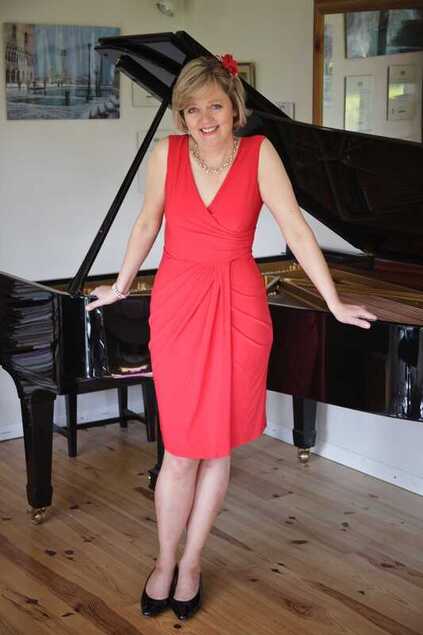
October
Angela Zanders
Angela Zanders gave a fascinating lecture recital entitled Beethoven: The Revolutionary on 15 October at the University of Chichester. This event had to be live streamed due to Covid restrictions and the Chairman of Chichester Music Society, Chris Hough, was also allowed to be present. He introduced Angela and explained that Beethoven was her favourite composer, she had studied in Vienna, and had lectured extensively and performed many of Beethoven’s seminal works.
Angela Zanders covered much of Beethoven’s life, emphasising that his own situation of poor health, deafness, eccentricity, and short temper, often led him to composing music that rose from deep despair to hope and inspiration. He went deaf at the very young age of 32, and she pointed out that if he had stopped composing at that time, he would be scarcely remembered today.
The piece that Angela first chose to play was Sonatina which he wrote aged 12 in 1782, in the style of the 18th Century. But after the French Revolution in 1789 Beethoven’s music began to alter, and his Symphony No3, the Eroica, epitomises this. The first half of the presentation was concluded with a performance of the Appassionata Sonata No 23, where she deployed this forceful music with delicacy and subtle touch.
Angela suggested that Beethoven wrote his later music, not for his contemporaries, but for a future age, although the first performance of his 9th Symphony was greeted in Vienna with wild applause. Two years later he was dead. His funeral brought Vienna to a standstill, with thousands lining the streets.
To conclude the concert Angela performed Sonata in A Major Opus 110, a piece written in 1821, that contains examples of all human emotions, from the tender to dynamic, from desolation to triumph. Angela’s greatest achievement from this evening’s lecture recital was to make the listener newly appreciate what an extraordinary contemporary composer Beethoven is, by playing some appropriate examples of his music and giving an exemplary summary of his amazingly successful life.
Chris Hough, Chairman of Chichester Music Society, thanked Angela Zanders for her lecture recital, saying, “Angela gave us a superb description of what Beethoven achieved, from the depths of his despair, to the triumphs of his music, and with flourishing expertise she chose the musical examples to illustrate his life so effectively.” Finally, he thanked the University for their help in live streaming the concert, allowing listeners to receive it in their homes. Apparently, some of them were in New Zealand and the USA.
Angela Zanders
Angela Zanders gave a fascinating lecture recital entitled Beethoven: The Revolutionary on 15 October at the University of Chichester. This event had to be live streamed due to Covid restrictions and the Chairman of Chichester Music Society, Chris Hough, was also allowed to be present. He introduced Angela and explained that Beethoven was her favourite composer, she had studied in Vienna, and had lectured extensively and performed many of Beethoven’s seminal works.
Angela Zanders covered much of Beethoven’s life, emphasising that his own situation of poor health, deafness, eccentricity, and short temper, often led him to composing music that rose from deep despair to hope and inspiration. He went deaf at the very young age of 32, and she pointed out that if he had stopped composing at that time, he would be scarcely remembered today.
The piece that Angela first chose to play was Sonatina which he wrote aged 12 in 1782, in the style of the 18th Century. But after the French Revolution in 1789 Beethoven’s music began to alter, and his Symphony No3, the Eroica, epitomises this. The first half of the presentation was concluded with a performance of the Appassionata Sonata No 23, where she deployed this forceful music with delicacy and subtle touch.
Angela suggested that Beethoven wrote his later music, not for his contemporaries, but for a future age, although the first performance of his 9th Symphony was greeted in Vienna with wild applause. Two years later he was dead. His funeral brought Vienna to a standstill, with thousands lining the streets.
To conclude the concert Angela performed Sonata in A Major Opus 110, a piece written in 1821, that contains examples of all human emotions, from the tender to dynamic, from desolation to triumph. Angela’s greatest achievement from this evening’s lecture recital was to make the listener newly appreciate what an extraordinary contemporary composer Beethoven is, by playing some appropriate examples of his music and giving an exemplary summary of his amazingly successful life.
Chris Hough, Chairman of Chichester Music Society, thanked Angela Zanders for her lecture recital, saying, “Angela gave us a superb description of what Beethoven achieved, from the depths of his despair, to the triumphs of his music, and with flourishing expertise she chose the musical examples to illustrate his life so effectively.” Finally, he thanked the University for their help in live streaming the concert, allowing listeners to receive it in their homes. Apparently, some of them were in New Zealand and the USA.
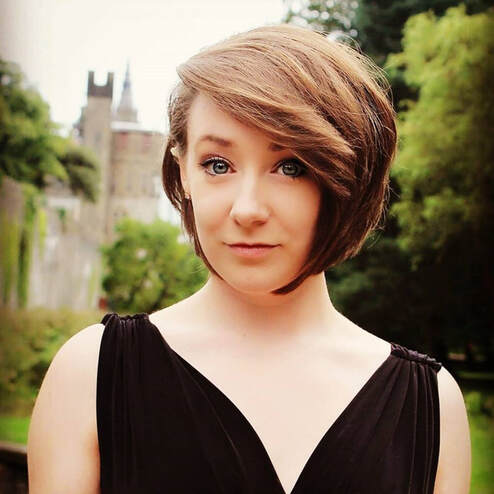
September
Erin Alexander
Chichester Music Group welcomed back Erin Alexander [soprano] and Nick Miller [piano] on 29 September to the Society’s first “socially distanced” concert at the University of Chichester, which was also live-streamed. This was a new experience for both the performers and the audience and, given these unusual circumstances, it was an enjoyable experience for all.
This concert was entitled “On a High Note”, which tells the story of soprano Graziella Scuitti, a contemporary of Maria Callas. Erin Alexander played the Italian singer, and she expertly maintained an effective Italian accent when in role. Nick Miller was an adept interviewer and they both created a believable platform, as they developed the life of Graziella Sciutti.
Graziella Scuitti’s stage career began in 1951 as she sang the role of Elisetta, the woman in The Telephone, which Erin performed with humour and skill, and then she sang songs from the characters that became Scuitti’s celebrated favourites, which during her career she performed over a hundred times each, Susanna, Despina, Rosina and Musetta.
The audience therefore enjoyed a wide selection of arias from Bach, Mozart, Verdi, Rossini, and Puccini. Erin Alexander’s performance was engagingly dramatic, and she sang with a very self-possessed vibrancy, particularly rising to the challenge of singing in the character of another opera singer. This was an extremely rewarding performance.
The accompaniment by Nick Miller was very supportive yet so buoyant that it led to a highly effective performance by both musicians. They are to be congratulated for producing a near to perfection performance both musically, as well as in the acting necessary to make the format of the evening believable. The small audience that was allowed were very appreciative.
At the short interval the Chairman of the Chichester Music Society, Chris Hough, explained that this concert was dedicated to Chris Coote, the Society’s Treasurer, who unfortunately had just tragically died after a short illness. He said, “This was a concert that Chris Coote would have loved. He was especially committed to the development of young, gifted artists and took a keen interest in our Charity and its work. Chris had many friends in the musical world, especially in the Chichester and Bognor Regis music scene. His financial skills as an actuary, and musical temperament gave CMS an excellent treasurer. He was a talented accompanist and a fine musician. We shall miss his wit, his friendship and expertise. Erin and Nick have produced a torrent of lovely music which we have all thoroughly enjoyed. They are to be congratulated.”
Erin Alexander then closed the concert with a poignant performance of the piece when she had first met Chris Coote at a Showcase Concert Competition. This was the competition which Erin had won. She said he was one of those rare individuals who would always had time for her, always be ready to provide help and advice, and as she said “he was so generous, with his time, his love, his soul, particularly for all of us young musicians, and even offered accommodation at his home when she was performing.”
Erin Alexander
Chichester Music Group welcomed back Erin Alexander [soprano] and Nick Miller [piano] on 29 September to the Society’s first “socially distanced” concert at the University of Chichester, which was also live-streamed. This was a new experience for both the performers and the audience and, given these unusual circumstances, it was an enjoyable experience for all.
This concert was entitled “On a High Note”, which tells the story of soprano Graziella Scuitti, a contemporary of Maria Callas. Erin Alexander played the Italian singer, and she expertly maintained an effective Italian accent when in role. Nick Miller was an adept interviewer and they both created a believable platform, as they developed the life of Graziella Sciutti.
Graziella Scuitti’s stage career began in 1951 as she sang the role of Elisetta, the woman in The Telephone, which Erin performed with humour and skill, and then she sang songs from the characters that became Scuitti’s celebrated favourites, which during her career she performed over a hundred times each, Susanna, Despina, Rosina and Musetta.
The audience therefore enjoyed a wide selection of arias from Bach, Mozart, Verdi, Rossini, and Puccini. Erin Alexander’s performance was engagingly dramatic, and she sang with a very self-possessed vibrancy, particularly rising to the challenge of singing in the character of another opera singer. This was an extremely rewarding performance.
The accompaniment by Nick Miller was very supportive yet so buoyant that it led to a highly effective performance by both musicians. They are to be congratulated for producing a near to perfection performance both musically, as well as in the acting necessary to make the format of the evening believable. The small audience that was allowed were very appreciative.
At the short interval the Chairman of the Chichester Music Society, Chris Hough, explained that this concert was dedicated to Chris Coote, the Society’s Treasurer, who unfortunately had just tragically died after a short illness. He said, “This was a concert that Chris Coote would have loved. He was especially committed to the development of young, gifted artists and took a keen interest in our Charity and its work. Chris had many friends in the musical world, especially in the Chichester and Bognor Regis music scene. His financial skills as an actuary, and musical temperament gave CMS an excellent treasurer. He was a talented accompanist and a fine musician. We shall miss his wit, his friendship and expertise. Erin and Nick have produced a torrent of lovely music which we have all thoroughly enjoyed. They are to be congratulated.”
Erin Alexander then closed the concert with a poignant performance of the piece when she had first met Chris Coote at a Showcase Concert Competition. This was the competition which Erin had won. She said he was one of those rare individuals who would always had time for her, always be ready to provide help and advice, and as she said “he was so generous, with his time, his love, his soul, particularly for all of us young musicians, and even offered accommodation at his home when she was performing.”
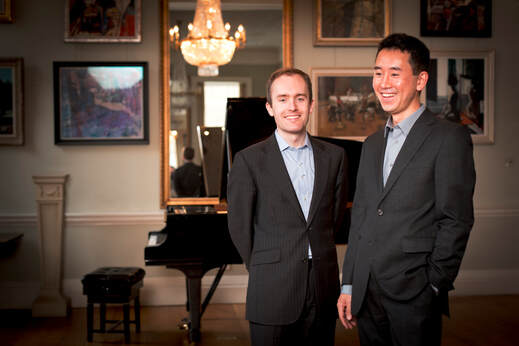
March
Parnassius Piano Duo
The Funtington Music Group were given a real treat on 11 March at the University of Chichester when they welcomed the Parnassius Piano Duo. The concert took place in the Chapel where the University has two splendid Steinways which were the centre of the concert.
Simon Callaghan and Hiroaki Takenouchi were the two fine pianists, and they had chosen to open the concert with only the second or third performance in the UK of the Sonata for Two Pianos in C Minor by Percy Sherwood. This English composer was working in Germany at the time of its composition in 1890 as a Professor in the Dresden Conservatory.
The first movement started at full throttle and was played with a controlled whirling frenzy from the start. The Duo played the second movement with a tenderness and romance that was a happy interlude before the vibrancy and exuberance of the Finale. The Sonata is a little known work in European music but it was played with such enthusiasm and gusto that at its end the audience were very complimentary in their applause.
After the interval the Duo played Rachmaninov’s Suite No 2 for Two Pianos Opus 17. This piece was written in 1901, just after Rachmaninov had recovered from the disaster of the first performance of his First Symphony. As Simon Callaghan said in his introduction, “Rachmaninov was very skilful in writing for two pianos as neither piano is the dominant and the music is shared equally.”
Simon Callagahn and Hiroaki Takenouchi had met in 2003 and their mutual understanding can not be overstated as in the Rachmaninov they together created a masterpiece of immaculate coordination and musical virtuosity. Technically dazzling, nothing seemed out of reach or impossible, either emotionally or artistically. The audience loved their performance.
Chris Hough, Chairman of Funtington Music Group, said, “This was a wonderful performance by two extremely talented pianists. It was a pleasure to hear Sherwood’s unjustly neglected piece, and a joy hear Rachmaninov’s marvellous music. A truly memorable evening.”
Parnassius Piano Duo
The Funtington Music Group were given a real treat on 11 March at the University of Chichester when they welcomed the Parnassius Piano Duo. The concert took place in the Chapel where the University has two splendid Steinways which were the centre of the concert.
Simon Callaghan and Hiroaki Takenouchi were the two fine pianists, and they had chosen to open the concert with only the second or third performance in the UK of the Sonata for Two Pianos in C Minor by Percy Sherwood. This English composer was working in Germany at the time of its composition in 1890 as a Professor in the Dresden Conservatory.
The first movement started at full throttle and was played with a controlled whirling frenzy from the start. The Duo played the second movement with a tenderness and romance that was a happy interlude before the vibrancy and exuberance of the Finale. The Sonata is a little known work in European music but it was played with such enthusiasm and gusto that at its end the audience were very complimentary in their applause.
After the interval the Duo played Rachmaninov’s Suite No 2 for Two Pianos Opus 17. This piece was written in 1901, just after Rachmaninov had recovered from the disaster of the first performance of his First Symphony. As Simon Callaghan said in his introduction, “Rachmaninov was very skilful in writing for two pianos as neither piano is the dominant and the music is shared equally.”
Simon Callagahn and Hiroaki Takenouchi had met in 2003 and their mutual understanding can not be overstated as in the Rachmaninov they together created a masterpiece of immaculate coordination and musical virtuosity. Technically dazzling, nothing seemed out of reach or impossible, either emotionally or artistically. The audience loved their performance.
Chris Hough, Chairman of Funtington Music Group, said, “This was a wonderful performance by two extremely talented pianists. It was a pleasure to hear Sherwood’s unjustly neglected piece, and a joy hear Rachmaninov’s marvellous music. A truly memorable evening.”
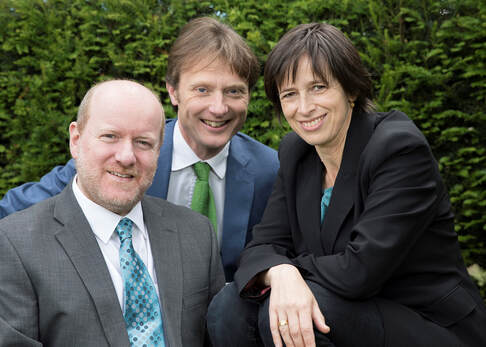
February
The London Bridge Trio
The Funtington Music Group were thrilled with the performance that the London Bridge Trio gave on 12 February at the University of Chichester. This was the first visit of the Trio and it certainly won’t be its last!
The concert opened with Haydn’s Piano Trio in F Sharp Minor, and the Trio interpreted this delightful piece with variety, personality and sparkling invention. Daniel Tong [piano] gave a stunning performance, his virtuosity apparent right from the beginning. The Trio played the Adagio Cantabile with a mixture of introspection and restrained elegance which fitted the music perfectly.
The second piece was the Piano Trio in D Minor by Faure. This starts with a melody led by the cello which was beautifully played by Kate Gould. She produced a rich, generous and often passionate sound which added some wonderful emotional momentum to the music.
The London Bridge Trio then, after the interval, played Beethoven’s Piano Trio in B Flat Major Opus 97, the Archduke. This was Beethoven’s last piano Trio and is probably his best. The Trio produced a beautiful and well-balanced tone, with a noticeable dedication to perfection. In the Archduke, Beethoven allows each instrument its own individuality, which the musicians interpreted so effectively that their brilliant performance as a Trio was memorable. It was certainly much appreciated by the audience.
Both the violinist, David Adams and the cellist Kate Gould are string musicians of equal exceptional ability, and along with such a virtuosic pianist as Daniel Tong, the result was a masterpiece of elegance, lyric beauty, spiritual serenity, and at the end a joyful yet heroic finale.
The Chairman of the Funtington Music Group, Chris Hough, said, “This was a marvellous concert. The Trio gave us sensitive and insightful performances and showed real virtuosity throughout the concert, with wonderful performances of the music of three very different composers. It was an evening to cherish.”
The London Bridge Trio
The Funtington Music Group were thrilled with the performance that the London Bridge Trio gave on 12 February at the University of Chichester. This was the first visit of the Trio and it certainly won’t be its last!
The concert opened with Haydn’s Piano Trio in F Sharp Minor, and the Trio interpreted this delightful piece with variety, personality and sparkling invention. Daniel Tong [piano] gave a stunning performance, his virtuosity apparent right from the beginning. The Trio played the Adagio Cantabile with a mixture of introspection and restrained elegance which fitted the music perfectly.
The second piece was the Piano Trio in D Minor by Faure. This starts with a melody led by the cello which was beautifully played by Kate Gould. She produced a rich, generous and often passionate sound which added some wonderful emotional momentum to the music.
The London Bridge Trio then, after the interval, played Beethoven’s Piano Trio in B Flat Major Opus 97, the Archduke. This was Beethoven’s last piano Trio and is probably his best. The Trio produced a beautiful and well-balanced tone, with a noticeable dedication to perfection. In the Archduke, Beethoven allows each instrument its own individuality, which the musicians interpreted so effectively that their brilliant performance as a Trio was memorable. It was certainly much appreciated by the audience.
Both the violinist, David Adams and the cellist Kate Gould are string musicians of equal exceptional ability, and along with such a virtuosic pianist as Daniel Tong, the result was a masterpiece of elegance, lyric beauty, spiritual serenity, and at the end a joyful yet heroic finale.
The Chairman of the Funtington Music Group, Chris Hough, said, “This was a marvellous concert. The Trio gave us sensitive and insightful performances and showed real virtuosity throughout the concert, with wonderful performances of the music of three very different composers. It was an evening to cherish.”
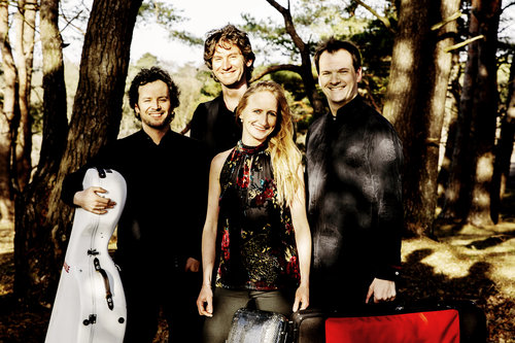
January
Navarra String Quartet
The Navarra String Quartet opened the Funtington Music Group’s 2020 Programme with a concert at the University of Chichester on 15 January.
The concert opened with a performance of Andreas Romberg’s String Quartet Opus 59 No 2. Romberg was a contemporary of Beethoven, but his music is far from well-known, and is still based in the pre-Beethoven era. However, the piece was a more than suitable introduction to the programme which was commemorating the 250th Anniversary of Beethoven’s birth, and the audience certainly enjoyed the performance.
The Navarra, with Magnus Johnston [violin], Marije Johnston [violin], Sasha Botha [viola], and Brian O’Kane [cello], gave a highly polished interpretation, as the music rotated from the joyous introduction in the first two movements, to a melancholic start of the third movement, before it moved into a more romantic phase, and concluded with the capricious finale of the fourth.
The second piece was Three Idylls by Frank Bridge. This English composer wrote the piece in 1906, as a gift to his future wife. Perhaps he was in a melancholy mood as the first two Idylls are rather dark, whereas the last is animated and lifts the entire work out of its moody introspection. The Navarra caught the spirit of the music absolutely and were particularly adept at portraying the transforming emotions from frost and winter in the first two movements, to the sun and summer of the third.
The climax of the evening was a stunning performance of Beethoven’s String Quartet in F, Opus 59, No 1 “Razumovsky”. This was a revolutionary work when first played. Passages of sublime beauty are often off set by rough hews, spectacular fiddling, tension filled sections, and striking changes in colour and mood. The Navarra were excellent, playing with an energy and intensity where it was particularly noticeable how they listened to each other and responded effectively to the challenging development of the music.
The audience were extremely appreciative, particularly enjoying the final movement, which probably rates as one of Beethoven’s most celebrated.
Chris Hough, Chairman of Funtington Music Group, said, “This was an outstanding concert and we are so grateful to the Navarra for their intense and committed playing, and particularly for commemorating Beethoven in such style and in such a memorable manner.”
Navarra String Quartet
The Navarra String Quartet opened the Funtington Music Group’s 2020 Programme with a concert at the University of Chichester on 15 January.
The concert opened with a performance of Andreas Romberg’s String Quartet Opus 59 No 2. Romberg was a contemporary of Beethoven, but his music is far from well-known, and is still based in the pre-Beethoven era. However, the piece was a more than suitable introduction to the programme which was commemorating the 250th Anniversary of Beethoven’s birth, and the audience certainly enjoyed the performance.
The Navarra, with Magnus Johnston [violin], Marije Johnston [violin], Sasha Botha [viola], and Brian O’Kane [cello], gave a highly polished interpretation, as the music rotated from the joyous introduction in the first two movements, to a melancholic start of the third movement, before it moved into a more romantic phase, and concluded with the capricious finale of the fourth.
The second piece was Three Idylls by Frank Bridge. This English composer wrote the piece in 1906, as a gift to his future wife. Perhaps he was in a melancholy mood as the first two Idylls are rather dark, whereas the last is animated and lifts the entire work out of its moody introspection. The Navarra caught the spirit of the music absolutely and were particularly adept at portraying the transforming emotions from frost and winter in the first two movements, to the sun and summer of the third.
The climax of the evening was a stunning performance of Beethoven’s String Quartet in F, Opus 59, No 1 “Razumovsky”. This was a revolutionary work when first played. Passages of sublime beauty are often off set by rough hews, spectacular fiddling, tension filled sections, and striking changes in colour and mood. The Navarra were excellent, playing with an energy and intensity where it was particularly noticeable how they listened to each other and responded effectively to the challenging development of the music.
The audience were extremely appreciative, particularly enjoying the final movement, which probably rates as one of Beethoven’s most celebrated.
Chris Hough, Chairman of Funtington Music Group, said, “This was an outstanding concert and we are so grateful to the Navarra for their intense and committed playing, and particularly for commemorating Beethoven in such style and in such a memorable manner.”

